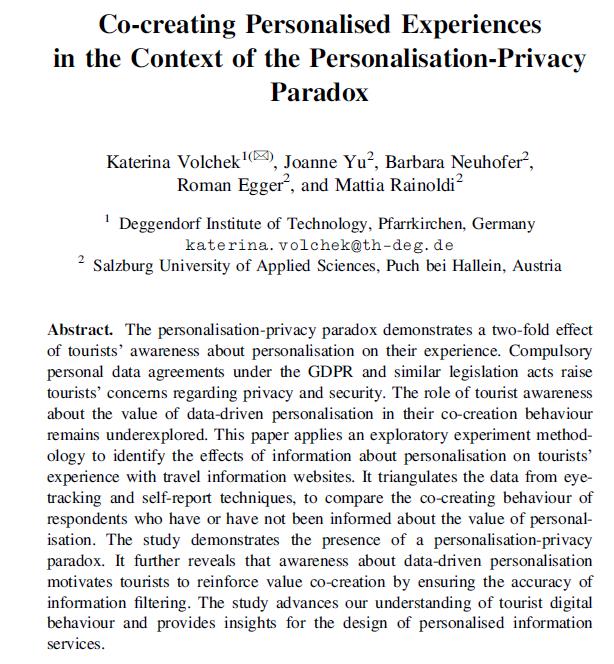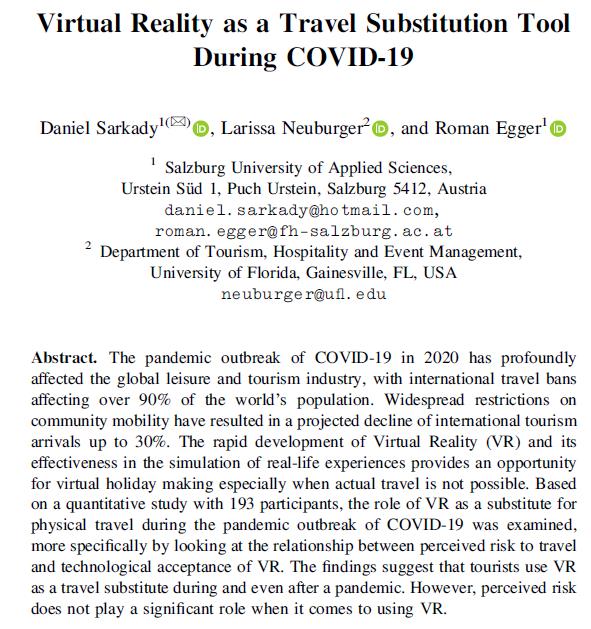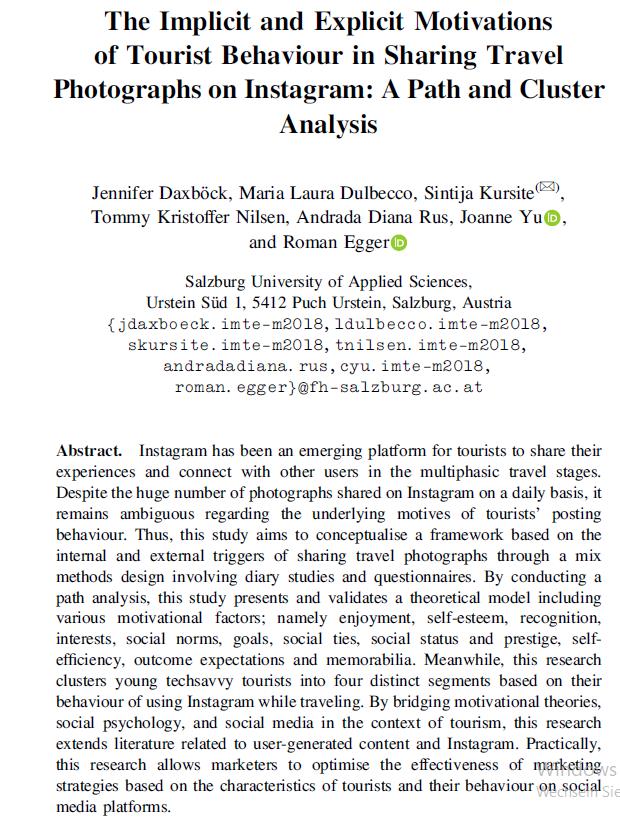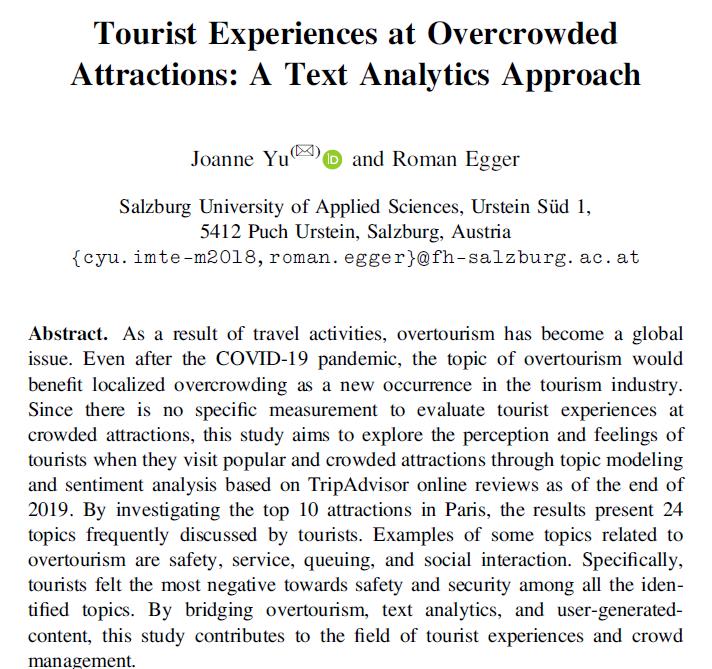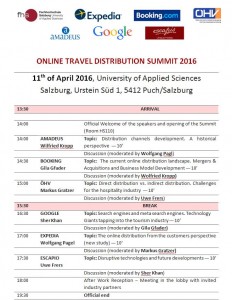The fourth and last presentation at the ENTER21 Conference was entitled: “Virtual Reality as a travel substitution tool during COVID-19” and presented by Daniel Sarkady. This research uses a structural equation model to analyze if VR has the potential to substitute travel during the pandemic. Well done Daniel! The full paper can be downloaded here!
Category Archives: Projects
Tourist Experiences at Overcrowded Attractions: A Text Analytics Approch – the Presentation @ ENTER21
Joanne Yu presented our paper “Tourist Experiences at Overcrowded Attractions: A Text Analytics Approch” at the ENTER 21 Conference. We did an analysis of 5000 English TripAdvisor posts each, for the most 10 popular tourist attractions in Paris. We did an Latent Dirichlet Allocation (LDA) and Sentiment Analysis (Vader) and got some quite interesting insights… Just have a look!
If you want to reach our full paper (nominated for the Best Paper Award this year), download it here.
Motivation to post on Instagram while traveling – the ENTER 21 presentation
Sintija Kursite just did a great presentation on behalf of her research group (eTourism Research – 3rd Semester Master) and me. We did a Structural Equation Modeling and a Cluster Analysis about Instagramers and their motivation to post on Instagram while traveling. The ENTER Prodeedings are open access this year, so just download our paper here.
ENTER 2021 – we are coming!
I am proud of the research I can do with my Master’s students. Next week we will be presenting no less than 4 papers – including a best paper nomination at the ENTER-Conference 2021 (Information and Communication Technologies in Tourism).
The proceedings will be published as open access this year. Check: https://lnkd.in/eXp_jFb
#research #tourism #students #science #
ENTER-Conference: 2nd Place – Best Paper Award
At the international ENTER conference, the world’s largest eTourism conference, which took place this year in Guildford at the University of Surrey in the UK, our Masterprogram achieved great success, as we were awarded second place in the Best Paper Award for their paper entitled “Exploring the Impact of Multisensory VR on Travel Recommendation: A Presence Perspective”.
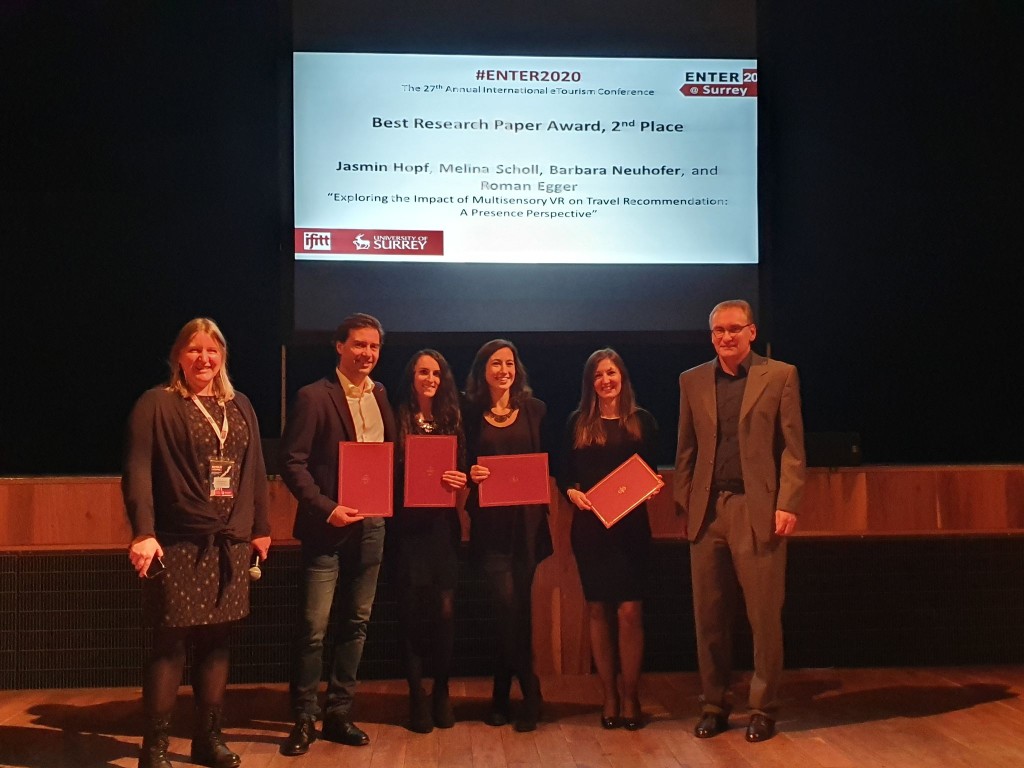
left to right: Roman Egger, Jasmin Hopf, Melina Scholl, Barbara Neuhofer
Roman Egger and Barbara Neuhofer had submitted a paper from the Research Seminar together with Master students. “With a rejection rate of 60%, ENTER is considered very selective. The fact that we were then nominated and even achieved second place makes us all the happier”, reports Roman Egger, head of the eTourism department and head of the Key Competencies & Research Methods. “In addition, you have to bear in mind that there were no other Master’s students presenting at the conference, so the competition was definitely very strong,” he adds.
The innovative study brings together the topics of eTourism and experience design. “We have researched how VR can be enriched with all senses in the future, resulting in an immersive experience for the participants”, says Barbara Neuhofer
Over the course of several semesters, the Master’s students work on a research project and the publication, which can then be submitted to a conference. This is a good opportunity to get students interested in research. The successful supervision of the scientific work is confirmed by this. Already in 2019 students could present their paper at the ENTER conference in Cyprus.
The participation gives students an insight into the academic world and has already inspired some of our students to continue with PhD studies.
The Rectorate and International Office of the FH Salzburg supported the students financially, so that they could present their publication on site. The next ENTER Conference will take place in China in 2021.
More information: https://enter2020.ifitt.org/
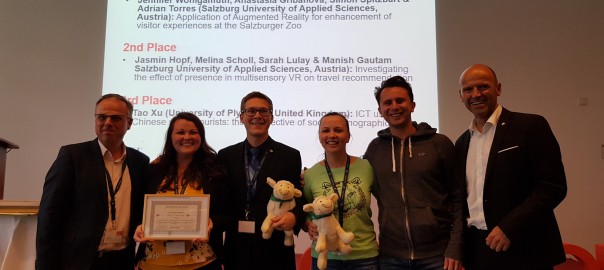
ISCONTOUR 2019, 8th International Student Conference in Tourism Research
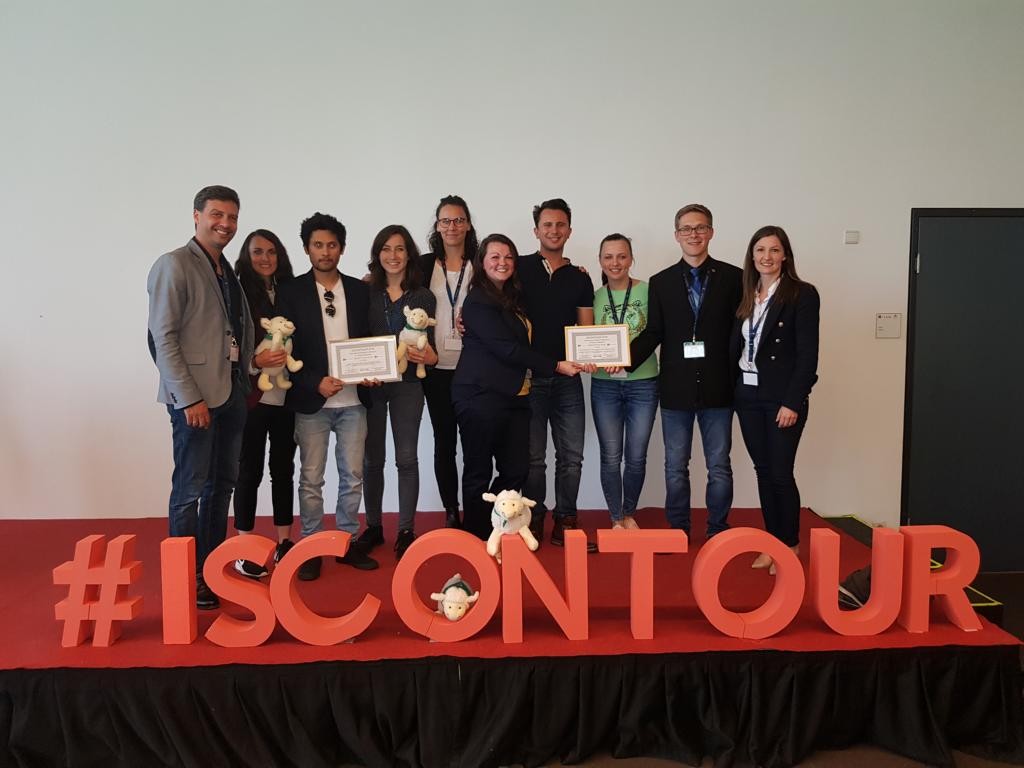
This year’s International Student Conference on Tourism Research (ISCONTOUR), organized jointly by FH-Krems and MCI Innsbruck, attracted about 300 participants from over 30 nations to Innsbruck to present their accepted papers.
Master’s students of the program Innovation and Management in Tourism (IMT) were also represented. The articles from the research seminar series “eTourism Research” (Prof. Roman Egger and Prof. Barbara Neuhofer) were submitted and all six papers were assessed in a tripple-blind-review procedure, despite a 50% rejection rate. Thus, the entire 4th semester of the Master students was on site to present their results at the ISCONTOUR.
The culmination of the event was the Best-Paper Award. Two groups won first and second place in the Best ICT Paper Award at the international competition. Victory was won by the study group Augmented Reality. They developed an AR prototype for the Salzburg Zoo to provide information about animals living in the zoo and tested the acceptance of such a solution. Second place went to the Virtual Reality group. In an experiment and with the help of biofeedback (heart rate, skin conduction ), they examined how 4D Virtual Reality (as additional stimuli, smells, wind, heat, etc.) differed from classic virtual reality in a holiday scenario with respect to the construct “presence”.
GPS-Tracking of Tourists
A group of students from our Master-Programme worked on GPS-Tracking of Tourists in order to analyze their geo-spatial-behaviour. 200 visitors of the Freilichtmuseum Salzburg (Open Air Museum) were equipped with GPS-Trackers and their waypoints and trajectories were analyzed. The interpretation of the data now helps the museum to optimize visitor flows and enhance the tourist experience.

This video shows the visitors movements in timelapse…
Visitor movements and heatmaps
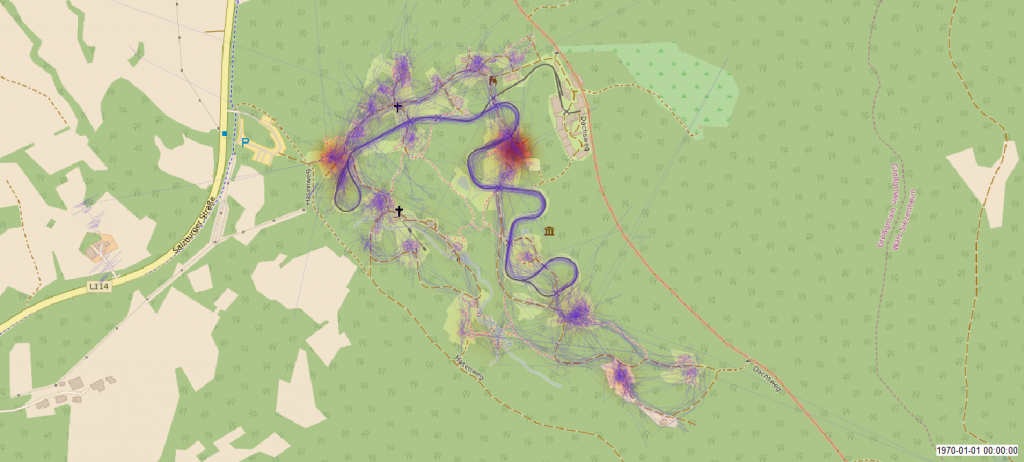
eTourism Research – Final Presentations
This week the students from the 3rd Semester Masters had to present their final project results. They have been woking on their topic for a year now.
The topics cover:
- “Digital vs. Personal Service in Tourism. A generational dilemma? An analysis of service preference of Generation X and Y”
- “Virtual Reality: An Innovative Sneak Preview for Destinations”
- “Virtual Reality: Customer’s telepresence”
- “Pictures with a new meaning – How photography affects the travel experience”
- “Tracking visitors´ spatial- temporal behavior through GPS Technology at Salzburg Open- Air Museum”
- “Do online travel agencies deceive customers? Conceptual review with focus on ethics”
- “Study of visitors’ perception of a Beacon-based museum guide: case of Salzburg Museum”
- “Difference of comments perception between men and women on destination picture promoted on Facebook”
- “Gamification as a tool to enhance the experience of museum visitors”
The groups also did a short video to present their project – click on the link to watch the video
Seven out of these papers are going to be presented at the ISCONTOUR 2017 conference!
Copy & paste for hotel mobile websites? Or: The power of screen sizes
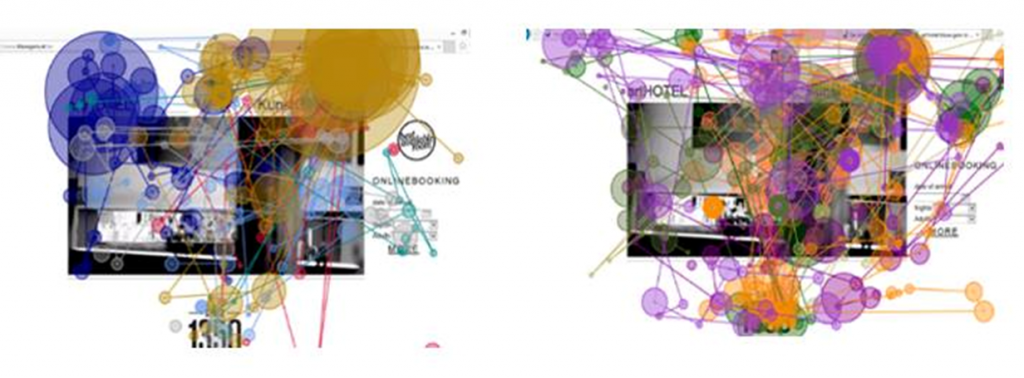 This is a project-summary from Melanie Fraiss, Sofiya Iliycheva, Mattia Rainoldi and Roman Egger
This is a project-summary from Melanie Fraiss, Sofiya Iliycheva, Mattia Rainoldi and Roman Egger
The growing popularity of mobile devices and their extended usage for travel and accommodation booking, have affected both the behavior of consumer and the development of the Tourism and Hospitality Industry (Buhalis & Law, 2008; Egger & Buhalis, 2008; Neuhofer, Buhalis & Ladkin, 2012). During their analysis in 2015, eMarketer predicted that by 2016 that 51.8% of all travel online bookings will come from mobile devices, such as smartphones and tablets (eMarketer, 2015). All this together possesses a big challenge for the developers of hotel mobile websites. Using responsive website design (RWD) to tailor the content of hotel websites to devices with different screen sizes might not be enough. Due to the fact that little attention has been given to the importance of hotel mobile websites, the aim of this paper is to explore the differences of usability and content of hotel mobile websites in the context of devices with different screen sizes. By means of a true experiment involving an eye-tracking study, think aloud protocols and semi-structured interviews, the findings of this research show that while hotel websites used RWD to ensure a uniform visual appearance on both smartphones and tablets, some major differences still emerged in terms of content importance and usability. It is recommended that in order to ensure customer satisfaction, hotel mobile websites should be designed separately for different mobile devices.
Feel the Pulse of Online Distribution
Online Travel Distribution Summit -11th of April – Salzburg University of Applied Sciences
Tourism is considered to be one of the largest industries worldwide and has seen a dramatic change since the emergence of the internet. According to a survey undertaken by TripAdvisor in October 2015, 65% of users (across generations) book their accommodations online. Travel intermediaries have seen disintermediation, followed by reintermediation and new market players have entered the “agora”. Huge mergers & acquisitions are happening on a daily basis and the interconnections are hardly comprehensible.
The aim of the Online Travel Distribution Summit is to bring light into this highly complex and fast changing topic, by inviting industry experts for an intensive panel discussion.
Let´s learn from leading professionals and hear which insights they share with us! For more information check out our Website: Online Travel Distribution Summit
Klick Programme to enlarge….
